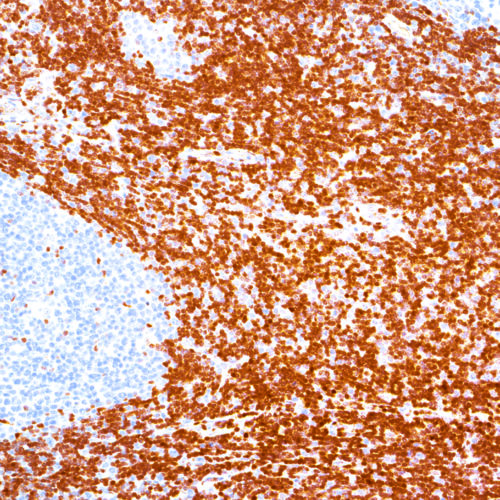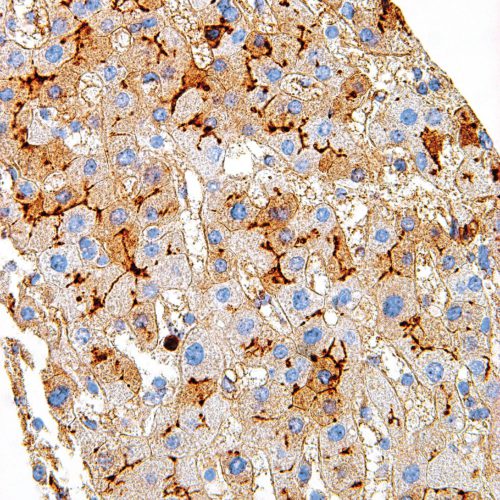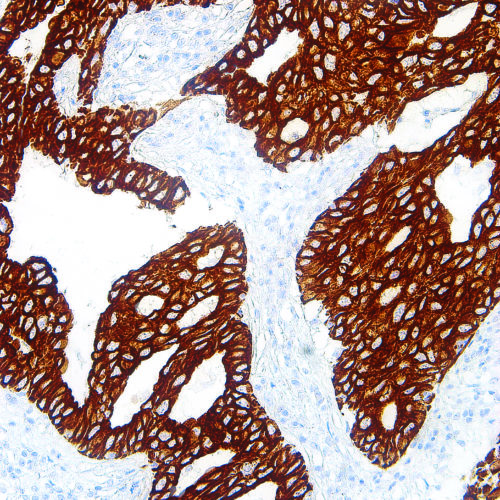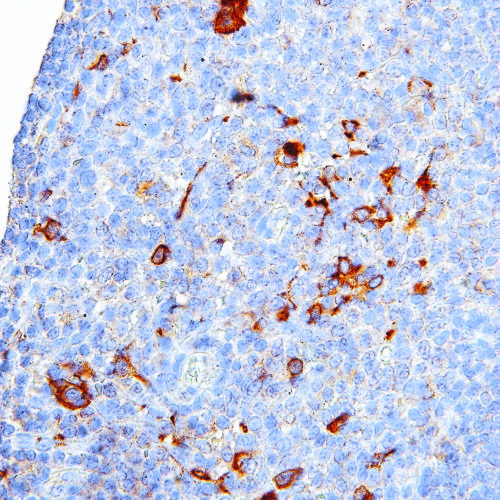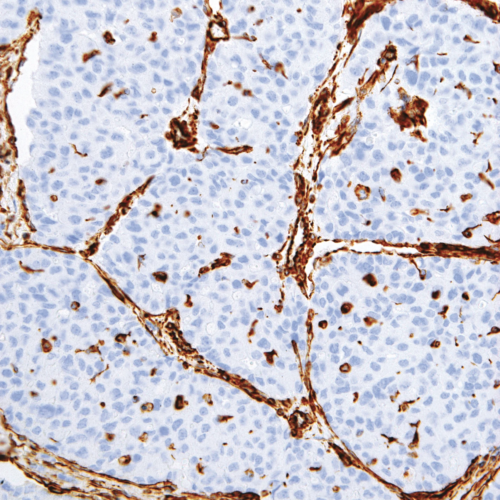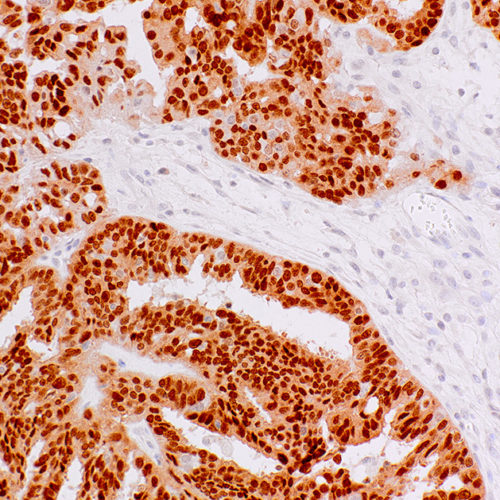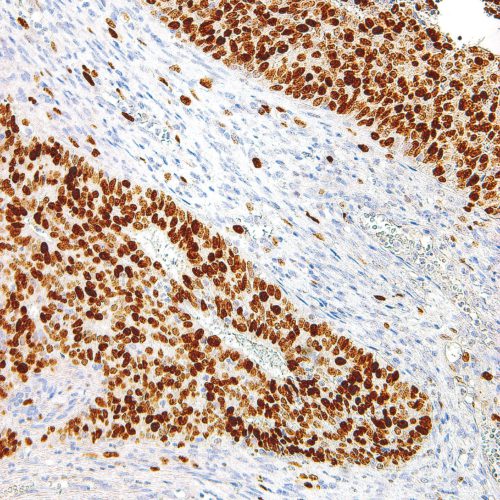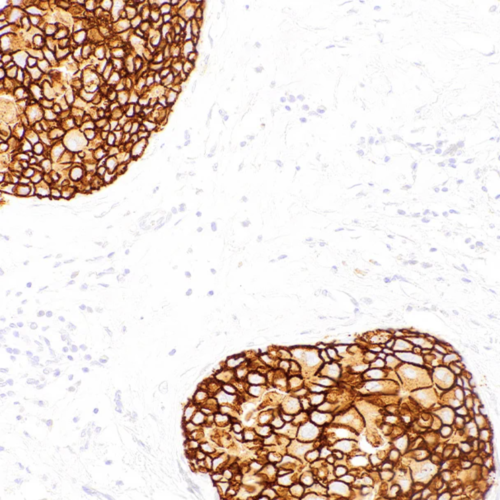High quality products to support Pathologists and Biological and Environmental Scientists
GeneAb™ p27
$107.50 – $397.75p27, also known as p27Kip1, is a cyclin-dependent kinase inhibitor that binds to and inhibits cyclin-dependent kinases, thereby regulating progression from G1 to S phase. Decreased expression of p27 is linked to poor prognosis in renal cell carcinoma, colon carcinoma, small breast carcinomas, non-small cell lung carcinoma, hepatocellular carcinoma, multiple myeloma, lymph node metastases in papillary carcinoma of the thyroid, and is associated with a more aggressive phenotype of carcinoma in the cervix.
GeneAb™ CD13
$204.25 – $919.12Cluster of Differentiation 13 (CD13) is a transmembrane protein that is overexpressed in both hematological and solid malignancies, including Acute Myeloid Leukemia (AML). Although hypogranular variants of AML are difficult to distinguish from other AML subtypes due to the morphology, the diagnosis of this variant is possible through using a panel of CD13, CD16, CD33, CD34, and CD117. Alternatively, a panel of CD13, CD34, CD43, CD68, CD117, CD163, lysozyme, and MPO is very useful for accurately diagnosing myeloid sarcoma and distinguishing it from large cell lymphoma, undifferentiated carcinoma, lymphoblastic lymphoma, malignant melanoma, Burkitt’s lymphoma, extra-medullary hematopoiesis, and inflammation. Since CD13 is expressed in both normal and neoplastic liver tissues, CD13 staining is useful for distinguishing between hepatocellular carcinoma and non-hepatocellular neoplasms.
GeneAb™ Cytokeratin 7
$102.12 – $451.50Cytokeratin 7 (CK7) is a type II keratin which is present in transitional, ductal, glandular, and biliary duct epithelial cells. Cytokeratin 7 is a useful marker for distinguishing between carcinomas of the lung, breast, endometrium, and urothelia (positive stain) from carcinomas of the colon and prostate (negative stain). Cytokeratin 7 is present in nearly all primary lung adenocarcinomas, and is a useful marker in the differential diagnosis of ovarian neoplasms. Anti-Cytokeratin 7 does not stain intermediate filament.
GeneAb™ CTLA-4
$129.00 – $989.00Cytotoxic T-Lymphocyte-Associated Protein 4 (CTLA-4) is a receptor on T helper cells that functions as an immune checkpoint and downregulator of immune responses. Mutations in CTLA-4 are associated with insulin-dependent diabetes mellitus, Hashimoto’s thyroiditis, Graves’ disease, systemic lupus erythematosus (SLE), celiac disease, primary biliary cirrhosis, thyroid-associated orbitopathy, multiple sclerosis, and other autoimmune diseases. The spliced variant of CTLA-4 in SLE is present in the patient’s serum. Haploinsufficiency of CTLA-4 causes the immune system disorder known as CTLA-4 deficiency or CHAI disease (CTLA-4 haploinsufficiency with autoimmune infiltration).
GeneAb™ Vimentin
$64.50 – $311.75Vimentin is a component of intermediate filament in mesenchymal cells, such as endothelial cells, fibroblasts, lymphocytes, and melanocytes. Anti-Vimentin is useful for assessing whether tissue samples have been processed and preserved properly. A panel of Anti-Vimentin and Anti-Keratin is useful for differentiating melanomas from large cell lymphomas and undifferentiated carcinomas. This diagnostic grade Vimentin IVD antibody stains melanomas and schwannomas, as well as Endometrial endometrioid adenocarcinomas.
GeneAb™ PAX-8
$161.25 – $838.50PAX-8 is a member of the paired box (PAX) family of transcription factors, which are key regulators in early development. This protein plays a role in development of thyroid follicular cells and the expression of thyroid-specific genes, with mutations in the PAX-8 gene linked to thyroid follicular carcinomas, atypical thyroid adenomas, and thyroid dysgenesis. The PAX-8 protein is expressed in simple ovarian inclusion cysts and non-ciliated mucosal cells of the fallopian tubes, but is absent from normal ovarian surface epithelial cells. PAX-8 is also not expressed in normal lung or lung carcinomas. Reports have associated PAX-8 expression with renal carcinoma, nephroblastoma, and seminoma, and have indicated PAX-8 as a useful marker for renal epithelial tumors, ovarian cancer, and for differential diagnoses in lung and neck tumors. Anti-PAX-8 can be useful in determining the primary site of invasive micropapillary carcinomas of ovary from bladder, lung, and breast, when used in adjunct with a panel of organ-specific markers such as uroplakin, mammaglobin, and TTF-1.
GeneAb™ Ki-67
$80.62 – $365.50Ki-67 is a nuclear, non-histone protein that is expressed only during active phases of the cell cycle (G1, S, G2 and M), but not in the resting phases (G0 and G1 early phase). Although the antigen has also been associated with ribosomal RNA transcription, it is strongly linked to cell proliferation and has thus been indicated as an effective marker in grading the proliferation rate of tumors, including those of the brain, breast, cervix, and prostate.
GeneAb™ HER2/neu
$96.75 – $483.75The Her2/Neu (c-erbB-2) proto-oncogene is a transmembrane receptor tyrosine kinase that is clinically indicated in a number of carcinomas. Overexpression of the c-erbB-2 protein has been associated with ductal breast cancer, as well as pulmonary and gastric adenocarcinomas. A correlation between Her2 and p53 has also been documented, as overexpression of both proteins has been associated with early invasion and metastasis in bladder cancer.
